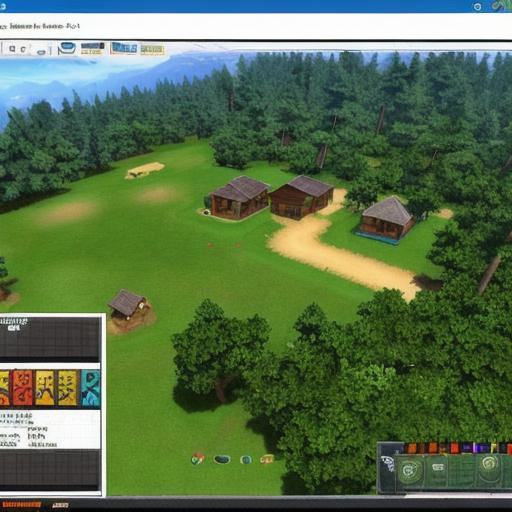The game development industry has seen rapid growth in recent years, and this trend is expected to continue as mobile gaming, console gaming, and PC gaming continue to gain popularity. The field of game development encompasses many different roles and responsibilities, from programming to art design, making it an attractive career option for individuals with diverse skill sets. In this comprehensive guide, we will explore the steps required to become a game developer, including tips for SEO optimization to increase your visibility in search engines.
- What is Game Development?
Game development involves creating video games or interactive applications that can be played on various platforms such as mobile devices, consoles, and PCs. The process of game development requires collaboration between individuals with different skill sets, including designers, programmers, artists, and producers. Game development can take many forms, ranging from 2D art games to complex simulations and multiplayer experiences.
- What Skills are Required to Become a Game Developer?
Becoming a game developer requires a combination of technical and creative skills. Some of the essential skills required include:
- Programming: Knowledge of programming languages such as C++, Java, or Python is essential for game development. Game developers must be able to write clean, efficient, and optimized code that runs smoothly on different platforms.
- Game Design: Understanding of game design principles and mechanics is crucial for creating engaging games. Game designers must be able to create compelling storylines, characters, and levels that keep players engaged and motivated.
- Art: Basic knowledge of art software and design principles is necessary for creating visually appealing game assets such as textures, models, and animations.
- Creativity: The ability to think creatively is essential for developing unique and innovative games. Game developers must be able to come up with fresh ideas and solutions to complex problems that arise during the development process.
- What are the Steps to Become a Game Developer?
Here are the steps to become a game developer:
Step 1: Learn Programming
The first step towards becoming a game developer is learning programming. You can start with basic programming concepts, such as loops and variables, and gradually progress to more advanced topics like algorithms and data structures. Online courses and tutorials are an excellent resource for beginners to learn programming. Platforms like Codecademy, Udemy, and Coursera offer courses on various programming languages that are relevant to game development.

Step 2: Choose a Game Development Platform
The next step is to choose a game development platform. Some of the popular game development platforms include Unity, Unreal Engine, and Construct. You should choose a platform that matches your skill level and the type of game you want to develop. For example, if you are new to game development, Unity is an excellent choice as it has a beginner-friendly interface and extensive documentation.
Step 3: Learn Game Design Principles
Game design principles are essential for creating engaging games. You can learn game design principles by studying game design theory or by working on small projects with other game developers. There are many resources available online to help you learn game design, including blogs, tutorials, and courses. Platforms like Udemy and Skillshare offer courses on game design that cover topics such as level design, user interface design, and narrative writing.
Step 4: Create a Portfolio
Creating a portfolio is an excellent way to showcase your skills and attract potential employers. Your portfolio should include samples of your work, such as code snippets, artwork, and game demos. You can use platforms like GitHub, ArtStation, or Itch.io to host your portfolio online and share it with others.
Step 5: Network with Other Game Developers
Networking is crucial for finding job opportunities in the game development industry. You can network with other game developers by attending conferences, joining online communities, or participating in game jams. Attending gaming events such as E3, GDC, and IndieCade can also help you connect with like-minded individuals and learn about the latest trends in game development.
- SEO Optimization Tips for Game Development Articles
Here are some tips to optimize your game development articles for search engines:
- Use relevant keywords: Identify the most relevant keywords for your article and include them in the title, headings, and throughout the content. For example, if you are writing an article about creating a 2D platformer game using Unity, keywords such as "Unity 2D platformer," "2D game development," and "platformer game design" can be used to optimize your article for search engines.
- Include images and videos: Including relevant images and videos in your articles can help increase engagement and improve your search engine rankings. Images and videos can also provide visual examples of the concepts you are discussing, making your articles more accessible to readers.
- Use headings and subheadings: Using headings and subheadings in your articles can make them more scannable and easier to read. Headings can help break up long paragraphs and make it easier for readers to find the information they need.
- Share on social media: Sharing your articles on social media platforms such as Twitter, Facebook, and LinkedIn can help increase their visibility and attract more traffic to your website. Use relevant hashtags when sharing your articles to reach a wider audience.
- Summary
Becoming a game developer requires a combination of technical and creative skills, as well as dedication and perseverance. By following the above steps and optimizing your articles for search engines, you can increase your visibility and attract more traffic to your website. With hard work and determination, you too can become a successful game developer and contribute to the growing game development industry.
